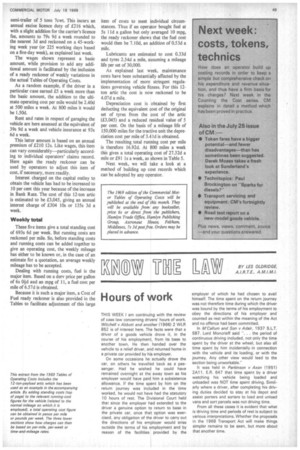Hours of work
Page 51

If you've noticed an error in this article please click here to report it so we can fix it.
THIS WEEK I am continuing with the review of case law concerning drivers' hours of work. Witchell v Abbott and another (1966) 2 WLR 852 is of interest here. The facts were that a driver of a goods vehicle drove it, in the course of his employment, from its base to another town. He then handed over the vehicle to a relief driver, and returned home in a private car provided by his employer.
On some occasions he actually drove the car, on others he travelled back as a passenger. Had he wished he could have remained overnight at the away town as his employer would have paid him a subsistence allowance. If the time spent by him on the return journey was included in the time worked, he would not have had the statutory 10 hours of rest. The Divisional Court held that since the employer had extended to the driver a genuine option to return to base in the private car, once that option was exercised, any obligation of the driver to carry out the directions of his employer would arise outside the terms of his employment and by reason of the facilities provided by the employer of which he had chosen to avail himself. The time spent on the return journey was not therefore time during which the driver was bound by the terms of his employment to obey the directions of his employer and counted as rest within the meaning of the Act and no offence had been committed.
In M'Callum and Son v Adair, 1937 S.L.T. 587. Lord Moncrieff said ". . . the period of continuous driving included, not only the time spent by the driver at the wheel, but also all time spent by him incidentally in connection with the vehicle and its loading, or with the journey. Any other view would lead to the section being unworkable."
It was held in Parkinson v Axon (1951) 2A11. E.R. 647 that time spent by a driver watching his vehicle being loaded and unloaded was NOT time spent driving. Similarly where a driver, after completing his driving duties decided to stay at his depot and assist porters and sorters to load and unload vans and sort parcels was not driving time.
From all these cases it is evident that what is driving time and periods of rest is subject to various interpretations. Whether the proposals in the 1968 Transport Act will make things simpler remains to be seen, but more about that another time.
















































































































